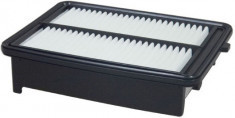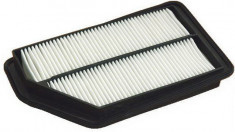-25%
AIR FILTER HONDA CIVIC FK3 FN3 PRICE IN KENYA
Air filter for Honda Civic price in Kenya is ksh 1,500. This air filter with reference number 17220-RSR-E00 cleans the air that circulates through your heating and cooling system. It traps and holds many types of particulates and contaminants that could affect your health and comfort including dust, dirt and Pollen.
The air filter is a fundamental component of a vehicle’s engine system, tasked with filtering incoming air before it reaches the engine. It plays a crucial role in ensuring clean air for combustion, protecting the engine from contaminants, and maintaining optimal performance. Understanding the importance of the air filter and recognizing signs that indicate the need for replacement is essential for preserving engine health and enhancing overall vehicle efficiency.
Importance of the Air Filter:
- Engine Protection: The primary function of the air filter is to protect the engine from airborne contaminants, such as dust, dirt, pollen, and debris. By filtering out these particles, the air filter prevents them from entering the engine cylinders during the combustion process. This protection is essential for preventing premature wear and damage to internal engine components.
- Optimal Combustion: Clean air is crucial for achieving optimal combustion in the engine. The air filter ensures that the air entering the combustion chamber is free from impurities, allowing for a precise air-fuel mixture. Proper combustion enhances engine efficiency, fuel economy, and overall performance.
- Extended Engine Life: By preventing contaminants from reaching critical engine components, the air filter contributes to the longevity of the engine. Reduced exposure to dirt and debris helps minimize wear on components such as cylinders, pistons, and valves, extending the overall lifespan of the engine.
- Improved Fuel Efficiency: A clean air filter promotes efficient combustion, resulting in improved fuel efficiency. When the engine receives a consistent and clean air supply, it can operate more efficiently, leading to better fuel consumption and reduced emissions. Regular air filter maintenance supports cost-effective and environmentally friendly driving.
- Enhanced Acceleration and Power: Optimal air filtration ensures that the engine receives an adequate supply of clean air for combustion. This contributes to improved acceleration and power, allowing the vehicle to respond more quickly to driver inputs. A well-maintained air filter supports a more responsive and enjoyable driving experience.
- Reduced Engine Deposits: Contaminants present in unfiltered air can contribute to the formation of deposits within the engine, affecting performance and efficiency. The air filter plays a crucial role in preventing these deposits, ensuring that the engine operates with clean and uncontaminated air.
Signs You Should Change the Air Filter:
- Decreased Engine Performance: A noticeable decrease in engine performance, such as reduced power, sluggish acceleration, or poor fuel efficiency, may indicate a clogged or dirty air filter. As the filter becomes more obstructed, the engine struggles to receive an adequate air supply, resulting in compromised performance.
- Reduced Acceleration: If the vehicle exhibits slower acceleration or struggles to reach higher speeds, it may be a sign that the air filter is restricting the airflow to the engine. A clogged air filter hinders the combustion process, leading to decreased power and acceleration.
- Poor Fuel Economy: A decrease in fuel efficiency, characterized by lower mileage per gallon, can be attributed to a dirty or clogged air filter. When the engine receives insufficient clean air, the fuel-to-air ratio becomes imbalanced, leading to increased fuel consumption and reduced overall efficiency.
- Unusual Engine Sounds: A clogged air filter can result in unusual sounds emanating from the engine, such as coughing, popping, or sputtering. These noises may indicate that the engine is struggling to receive the necessary air supply for combustion.
- Black Smoke from Exhaust: If the vehicle emits black smoke from the exhaust, it may be a sign of incomplete combustion due to a restricted airflow caused by a dirty air filter. Addressing this issue promptly is crucial for preventing further engine problems and minimizing environmental impact.
- Visible Dirt or Debris on the Filter: During routine inspections, if the air filter appears visibly dirty, clogged, or covered in debris, it is a clear sign that it needs replacement. A clean air filter should allow light to pass through easily, and any obstruction is an indication of reduced filtration efficiency.
- Check Engine Light Illumination: A clogged air filter can trigger the check engine light on the vehicle’s dashboard. Modern vehicles are equipped with sensors that detect abnormalities in the air-fuel mixture, and a dirty air filter can lead to such warnings. Diagnosing and addressing the issue is essential for maintaining engine health.
- Visible Dust or Dirt in the Air Intake Housing: Inspecting the air intake housing for the presence of dust or dirt is another way to assess the condition of the air filter. If contaminants are visible in this area, it indicates that the air filter is no longer effectively filtering incoming air and needs replacement.
Conclusion:
The air filter is a critical component for ensuring clean air intake, protecting the engine, and maintaining optimal performance. Recognizing signs that indicate the need for air filter replacement, such as decreased engine performance, poor fuel economy, and visible dirt on the filter, is crucial for preventing potential engine damage and ensuring the continued reliability of the vehicle. Regular air filter inspections, adherence to manufacturer recommendations for replacement intervals, and proactive maintenance contribute to the longevity and effectiveness of the air filter, supporting a smooth and efficient driving experience. By understanding the importance of the air filter and staying vigilant for signs of wear, vehicle owners can protect their engines and promote optimal performance on the road.



